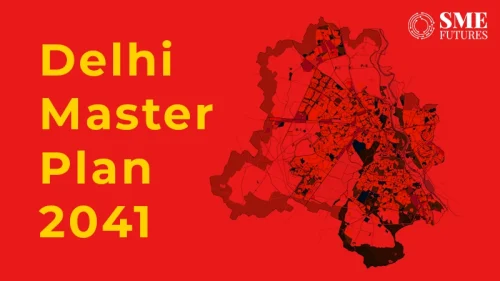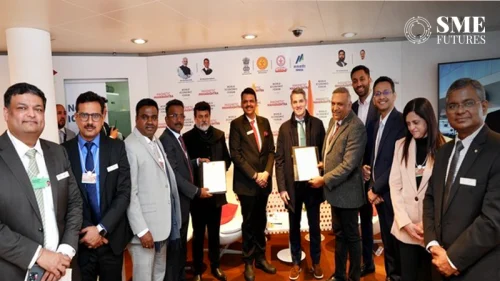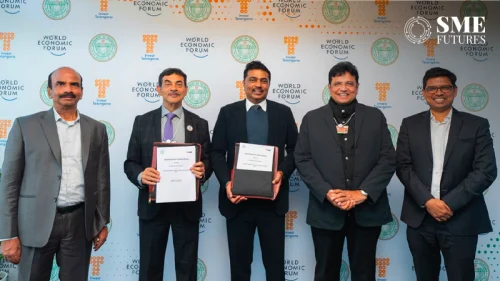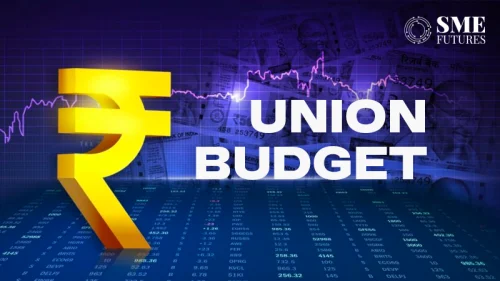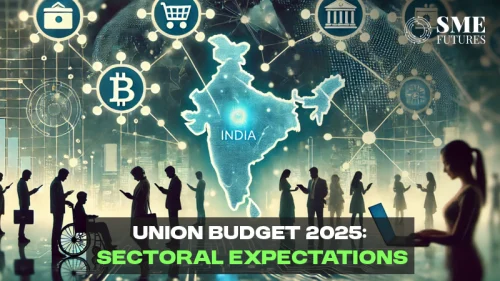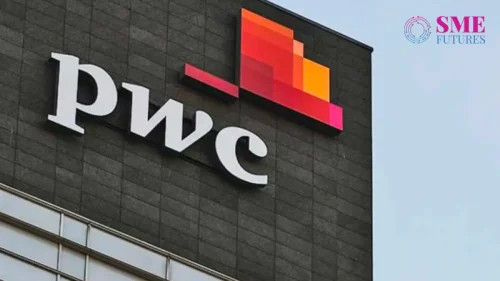The first Union Budget of the third decade of the 21st century presented by finance minister Nirmala Sitharaman unveiled a series of far-reaching reforms, aimed at energizing the Indian economy through a combination of short-term, medium-term, and long term measures. The budget was woven around three prominent themes of Aspirational India, Economic development for all and a caring society.
Billed as a Budget for entrepreneurs and MSMEs, Finance Minister Nirmala Sitharaman’s second budget speech in the parliament contained a slew of announcements to spur MSME sector’s growth. When it comes to budgetary allocation for the MSME Ministry, the allocation of this year stands at an all-time high of Rs. 7572 crore – an increase of 8% from the FY 2019-20 figures of Rs. 7011.29 crore.
In the historic longest budget speech, the finance minister announced that the turnover threshold would be raised by five times for audit from the existing one crore to five crore for businesses which carry out less than 5 per cent of their business transaction in cash.
Finance minister also announced a scheme to provide subordinated debt for entrepreneurs of MSMEs to be introduced. Besides, the government has also asked the Reserve Bank to extend the debt restructuring window for MSMEs by a year to March 31, 2021.
Sitharaman has also announced an app-based invoice financing loans product to be launched to obviate the problem of delayed payments and significant cash flows mismatches.
She further said that necessary amendments would be made to the Factor Regulation Act 2011 to enable non-banking financial companies (NBFCs) to extend invoice financing to MSMEs through TReDS, thereby enhancing the economic and financial sustainability.
A scheme of Rs 1,000 crore was also announced to extend handholding support to mid-sized companies in selected sectors such as pharmaceuticals, auto components and others for technology upgradations, R&D, business strategy, among others, to make them export competitive.
In addition to this, to make MSMEs more competitive a National Logistics Policy and Rs. 1,480 crore has been allotted for National Textile Mission.
Besides these new initiatives for the MSMEs, many schemes have seen a substantial rise in the area of funds.
Like the development of Khadi, Village and Coir Industries continued to be at the centre of attention, with significant heads seeing a substantial rise. The allocation for Scheme Fund for Regeneration of Traditional Industries (SFURTI) has been increased from Rs 125 crore to Rs 464.85 crore.
Also, Coir Vikas Yojana has increased from Rs 70.50 crore to Rs 103.87 crore and outlay for Khadi Grant (KG) has been hiked from Rs 308.51 to Rs 383.60 crore – an increase of 24.34%.
FM’s has also hiked allocations under ‘Infrastructure Development Programmes’. The total outlay for the sub-schemes, earlier standing at Rs 921.29 crore has now been hiked to Rs 1460 crore which is an increase of 58%. Under the same head, ‘Infrastructure Development and Capacity Building’ programmes have been hiked from the last Rs 419.57 crore to Rs 801.70 crore for FY 20-21.
Also, for the ‘Establishment of New Technology Centres’, the government has increased the total outlay to Rs 200 crore for net fiscal from Rs 125.12 crore earlier.
There may be an overall increase in the total allocation for the Ministry of MSME. Besides few schemes, a closer look upon several subheads reveal that overall outlay to many MSME-centric schemes has been cut.
For example, while the allocation under Prime Minister Employment Generation Programme’s (PMEGP) has been raised from Rs 2327.10 crore last year to Rs 2500 crore this year, other credit schemes have taken a hit.
Interest Subsidy Eligibility Certificate – whose earlier budgetary allocation stood at Rs 30.89 crore in 2018-2019, but this year secured a nil share.
The most significant dip has come for the Credit Support Programme — its earlier share was Rs 597 crore, and this time it is allocated only Rs 100 crore – a cut of 83.25%.
Similarly, the allocation to the much useful scheme for MSMEs – Interest Subvention Scheme for Incremental Credit to MSMEs – has been cut from Rs 350 crore to Rs 200 crore – a 42.86% drop compared to the previous figure. It meant the total allocation in the PMEGP and Other Credit Support Schemes, has this time been curtailed from Rs 3274.14 crore last year to Rs 2800 crore — registering a drop of 14.48%.
Likewise, on the marketing front, the government did trim the outlay to many sub-schemes under its ‘Market Promotion Schemes’ bracket. The total allocation to the section that previously stood at Rs 127.63 crore last fiscal has now been reduced to Rs 74.63 crore – a drop of 41.53%.
Further, Marketing Assistance Scheme (MAS), a scheme used extensively by MSMEs witnessed a dip from its earlier figure of Rs 10.03 crore to Rs 0.04 crore. Likewise, the International Cooperation Scheme, a scheme by the MSME Ministry to facilitate MSMEs to become internationally competitive, saw a reduction in its outlay this time. The scheme’s earlier figure of Rs 30 crore has now been reduced to Rs 20 crore.
Under the ‘Entrepreneurship and Skill Development’ section in this year’s budgetary allocations shows that the FM has juggled with the allocations.
For example, the MSME Fund that in 2019-2020 stood at 100 crore, now sees a 50% reduction. However, the allocation for Fund of Funds has gone up from Rs 100 crore to Rs 200 crore. This has pushed up the total allocation for ‘Entrepreneurship and Skill Development’ from Rs 479.91 crore to Rs 556.47 crore.
Further, the total outlay to ‘Technology Upgradation and Quality Certification schemes’ has been reduced from its earlier figure of Rs 755.78 crore to the new figure of Rs 683.91 crore.
Further, the much crucial scheme for rural entrepreneurs, ASPIRE whose previous share stood at Rs 50 crore, has been slashed by Rs 30 crore.
Another scheme useful to MSMEs, i.e. Credit Linked Capital Subsidy and Technology Upgradation Scheme has been reduced to Rs 653.91 from the previous figure of Rs 705.78 crore.
With much emphasis on MSME segment in this budget, the government is aiming to boost the economy, through economic empowerment of citizens in the new decade.


